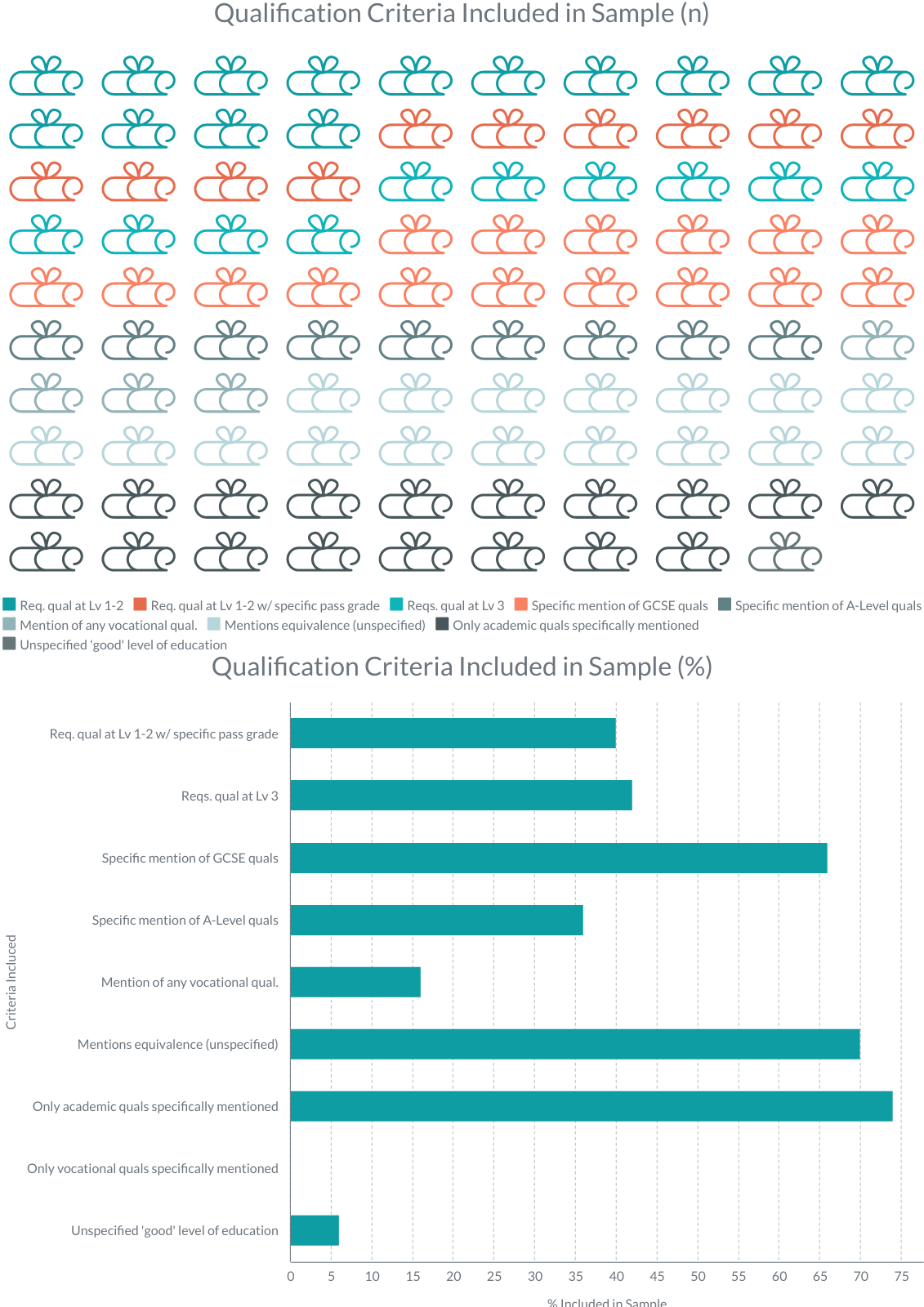On Qualifications - Part 1
Library recruitment qualification requirements at Levels 1-3 - Darren Flynn
In this FLJ blog post, I want to talk about using qualifications as criteria on person specifications. I’m not tackling here the thorny and perennial issue of specific LIS or HE-level qualifications (our already manifesto sets out our position and rationale re. LIS and UG/PG quals.) but rather the use of qualifications at Levels 1-3 on the England, Wales and Northern Ireland’s National Qualifications Framework. If the precise meaning of these isn’t immediately apparent, that is part of the issue.
In lay terms, this refers to criteria that require an applicant to hold a minimum qualification level gained at secondary school, sixth form or further education level such as GCSEs, AS/A-Levels, BTECs, T-Levels and NVQs. In practice, qualifications while equivalent are typically divided into academic (GCSEs, AS/A-levels) that are now assessed through examinations, and vocational (T-Level, BTEC Certificate/Diploma/Extended Diploma, NVQ) which are assessed by coursework or portfolio.
These qualifications refer only to England, Wales and Northern Ireland. Scotland uses a different framework.
The sample
In the course of reviewing recruitment documents for FLJ, I collect hundreds of person specifications for library jobs at all levels. This provides a large dataset that can be analysed to get an insight into common trends and criteria used to shortlist applicants. I wanted to explore what library recruiters required in qualifications from Levels 1-3. To do this I collected a total of 127 person specifications for UK library roles at a range of grades and sectors between March and September 2022. These were reviewed to identify those that included at least one criteria that was a qualification at Levels 1-3. This created a sample of 50 person specifications. This Padlet shows the sample, wording of the criteria, job title and essential/desirable status of the criterion with recruiters’ institutions removed. Using this data set, I coded each entry based on its content to produce an analysis of what levels and types of qualifications were specified. Below are the results in visual form with the raw data beneath.
Code / Criteria / Count (%)
Requires qual at Levels 1-2: 29 (58%)
Requires qual at Levels 1-2 with a specific pass grade: 20 (40%)
Requires qual at Level 3: 21 (42%)
Specific mention of GCSE quals: 33 (66%)
Specific mention of A-Level quals: 18 (36%)
Mention of any vocational qual: 8 (16%)
Mentions equivalence (unspecified): 35 (70%)
Only academic quals specifically mentioned: 37 (74%)
Only vocational quals specifically mentioned: 1 (2%)
Unspecified ‘good’ level of education (or similar): 3 (6%)
Key findings
Most ads included a criterion for a Level 1-2 qualification (58%). In all except one of these, GCSEs were specified as the required Level 1-2 qualification (rather than any other type of Level 1-2 qualification).
Of those the majority also mentioned a specific grade requirement at that qualification level (e.g. “5 x GCSE at grade A*-C”). In all cases where a grade requirement was mentioned at Levels 1-2 these referred to GCSE grades.
All but one of those mentioning a grade requirements at GCSE used the now-defunct A*-U grading system. Only one example used the current 1-9 grading system.
Qualifications at Levels 2-3 appeared in similar proportions (however some specifications mentioned both as required or Level 2 as essential and Level 3 as desirable)
Of the ads that included one or more named qualifications, all but one mentioned academic qualifications (GCSE and/or A-Level).
By contrast only 16% of the sample made mention of a named vocational qualification (BTEC, NVQ etc.)
74% of criteria mentioned only academic qualifications. Only one ad mentioned only vocational qualifications.
35 ads (70%) of the sample allowed an equivalent [to the named academic qualification]. Of these 7 mentioned a named vocational qualification. The remaining 28’s “equivalent” either unspecified alternative qualifications or work experience.
All qualification requirements referred to the England, Wales and Northern Ireland framework with no reference to the Scottish framework. However the sample contained no Scottish job adverts.
What does this tell us?
· Person specifications have not kept pace with the range of qualifications available and in most cases default to traditional academic qualifications. While most recruiters permitted some sort of equivalence, the ‘standard’ candidate was expected to hold traditional academic qualification (GCSEs and/or A-Levels).
· Person specifications have not kept pace with current grading systems, with most job ads specifying grading systems that are no longer in use (e.g. A*-C at GCSE).
· There is a bias in library recruitment towards seeking candidates with academic (rather than vocational) qualifications. Where equivalence was allowed, a candidate had to demonstrate they met the standard of an academically qualified candidate. A holder of academic qualifications was never required to show equivalence to someone vocationally qualified.
· Arguably there is a preconceived idea of a library worker as someone whose educational background is purely academic qualifications. This is evidenced by the default inclusion of academic only qualifications (e.g. A-Levels), the exclusion of named vocational qualifications and the lumping together of any knowledge or skills not demonstrated by an academic qualification as “equivalent”.
· Holders of Scottish or overseas qualifications would have to demonstrate equivalence to the England, Wales and Northern Ireland qualifications framework.
In Part 2 I will discuss why the findings of this analysis matter and what the possible equity implications of these are for the UK library sector.





